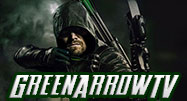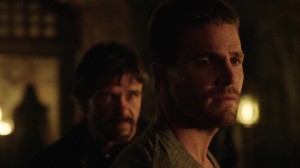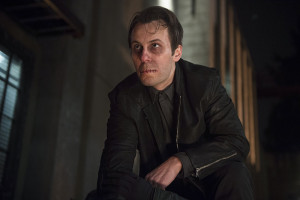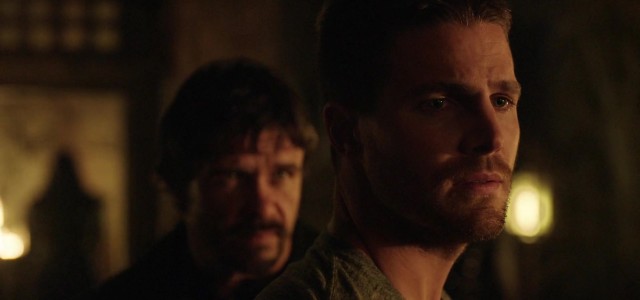
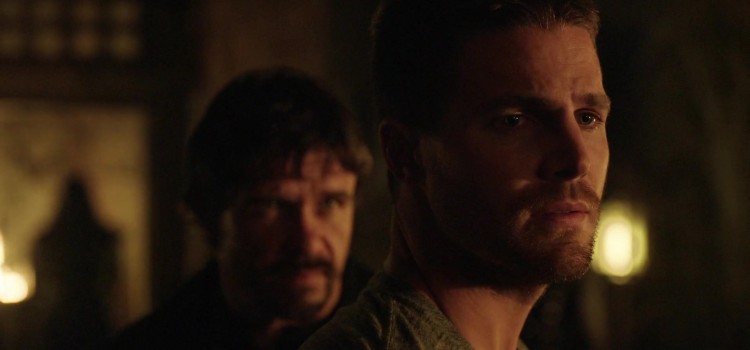
Arrow #3.16: “The Offer” Recap & Review
Recaps & Reviews March 23, 2015 Matt Tucker

Summary: A slow, methodical pace and daughters at odds with their fathers add to one of the best episodes of the season.
If you have not seen this episode yet and do not wish to be spoiled, do not continue reading!
Recap
Ra’s al Ghul makes Oliver an offer he has to consider to refuse: take his place. He shows Oliver the will of the League and explains how their vast resources can be at his command to do any bidding he wants. Oliver states he won’t lead a band of assassins. Ra’s explains that he can give the command not to kill as the new Ra’s, if he wants. He reveals to Oliver the secret of the Lazarus Pit, mystical waters that can heal and grant long life. The pit’s abilities are wearing off, and this is why Ra’s wants to appoint his heir.
As seemingly a sign of good faith, Ra’s gives Diggle and Malcolm back to Oliver and allows them all to leave Nanda Parbat and return to Starling City.
Everyone is surprised to see the three men returned. Oliver is reluctant to tell them why he was come back safely. He proceeds to set Nyssa free to return home to everyone’s shock. He insists they go out on patrol to let the city know that they are still there. They capture some criminals involved in a flawed diamond heist, and Oliver dumps them off at the police station for Lance, who is none too happy to see the vigilante. He tells the Arrow how he trusted him but that trust is broken because he never told Lance that Sara had been killed. Ra’s had mentioned that the cops would turn against the Arrow; Lance proves that right.
Oliver asks Felicity to track down the leader of the criminals, a man who had sewn his lips shut. He catches Ray and Felicity together as a couple. Felicity finds the man, nicknamed Murmur, and tries to see if Oliver is okay. He brushes it off.
At an existential crossroads by feeling he can’t do enough as the Arrow and that he’s lost Felicity to Ray, Oliver tells Diggle about Ra’s offer. Diggle is shocked that Oliver is legitimately considering it. Later, Felicity and Oliver have a heart-to-heart about what he’s considering. She explains that they all had to come to grips when they thought he’d died with why they are fighting crime for the city, and that perhaps it’s now Oliver’s turn.
Roy talks to some fencing contacts in the Glades. He and Diggle learn that the low-grade diamonds can be used to create armor-piercing rounds. They realize Murmur is planning to kill cops that falsely arrested him and coerced a confession out of him some time ago.
Thea tries to come to grips with what her father has done to her while he recovers on her couch, as well as what she has become in the last year. Laurel attempts to reconcile with her father, but Lance wants nothing to do with her. Meanwhile, Nyssa learns from her father that he wants Oliver as his heir. Feeling betrayed, she says she won’t stay there and stand for it. Ra’s tells her to leave.
Murmur’s men attack the police precinct. Lance runs cover for Laurel to get out of the building. She’s stopped by some of the men and attempts to fight them off. Nyssa appears and fights alongside her. The Arrow and Arsenal arrive to save Lance and take down Murmur. When he escapes, Oliver stops him outside. Lance runs out of the building and tells the Arrow he’s not going to thank him. He replies that it’s not why he does what he does.
Oliver thanks Felicity for helping to clarify things for himself. Now, with a renewed sense of purpose, he makes the choice not to be the next Ra’s. He informs Maseo, who tells him this isn’t a choice, echoing words from Malcolm Merlyn. Nyssa meets Laurel to talk about their fathers and Sara. She offers to train Laurel. Thea turns to Roy.
The remaining members of Murmur’s crew are attacked and killed by what appears to be the Arrow. He leaves one man alive to tell everyone what happened. Under the hood, it’s not Oliver. It’s Ra’s.
In the past, Oliver and Akio are trying to find someplace safe. They visit a botanical garden that Maseo and Tatsu told Akio to meet them at if he ever got separated from them. A number of men attempt to grab them and chase after them. On the street, Oliver and Akio run into … Shado.
Review
There is, perhaps, no greater narrative device than a child versus a parent. First and foremost, it’s thoroughly relatable. We all come from somewhere, and despite our individual relationships with our parents, it’s the type of connection with an importance that is instantly identifiable.
The next layer of that is the ever on-going debate about nature versus nurture. Are we slaves to our genetics or does the environment in which we were raised dictate our behaviors, our responses, our worldviews? Do our parents’ desires inform our lives, either to continue or to rebel against?
Hefty, weighty themes that power a multitude of fictional works over the ages. What is Luke Skywalker’s story if not a reflection of Anakin Skywalker’s fall into Darth Vader, a chance at redemption for the father? How many of the Greek myths are about one of Zeus’ children railing against him? What about all of the craziness that often pitted Alias‘ Sydney Bristow against both her mother and her father? Even Indiana Jones, we come to find out, is primarily motivated by a long-time misunderstood and antagonistic relationship with his historian father.
Comic books have made a mint off of various aspects of the parent-child relationship, either through abandonment by choice or death, uncovering previously unknown heredity, or finding themselves on opposite sides of an issue or the law. Oliver Queen’s story is certainly one heavily influenced by the relationship, both on the page and on the screen. In fact, Arrow has made a very pointed case of focusing on the connections between parents and children as one its primary themes. That makes this hour’s treatment of it not very surprising.
What is surprising is the spotlight on the relationship between a female character and her father, and not just one. More important, these are legitimate conflicts that are every bit as important as the usual sins of the father visited upon the son variety commonly found in comics and comic adaptations. These are philosophical issues that hit right to the heart and soul of each character involved, and each will have significant impacts on the show for the remainder of the season, if not longer.
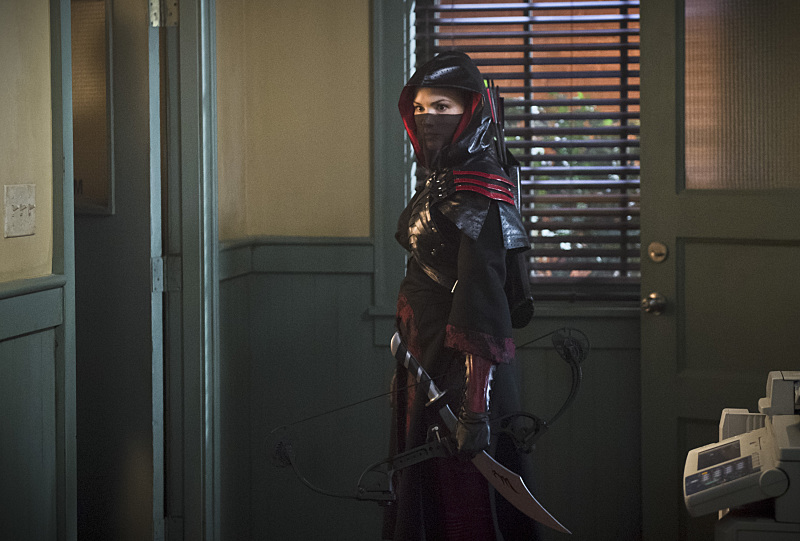
Nyssa’s is potentially the most relatable, as she comes to discover that her father does not intend to bequeath the family business, as it were, to her in favor of an outsider. At the same time, it’s a bit of a tricky situation that muddles the whole experience. Nyssa continues to accuse her father of prejudice against her for taking a woman as a lover. Ra’s is not only of advanced age, but would seem to come from a tradition that would take issue with a same-sex relationships. Yet every time they’ve addressed it with him on-screen, that doesn’t appear to be an issue for him. He continues to impress upon her that he felt the relationship weakened her not because of its sexuality but because of the person she was involved with. It feels as if they are attempting to make a point by continuously referencing it, but without a feeling that Ra’s truly harbors conservative viewpoints, it keeps thudding whenever she brings it up.
By contrast, the impression that Ra’s might hold antiquated views on the succession of a woman to the title he’s shepherded seems like an argument that could be made. It would seem he’s been aware for a while now that the powers of the Lazarus Pit are weakening on him and that he’ll need to find a replacement. Why would he not immediately turn to his daughter, his trusted right hand, and prepare her to take on the responsibility from him? Unless, of course, he’s only just discovered that the pit’s effects are lessening, around the time that Oliver survived their duel. As a man built on specific traditions, following the tenet that the man who is not killed by Ra’s al Ghul’s blade becomes Ra’s al Ghul could be a blinding focus for him, his child being female having no bearing on the process whatsoever. There are a lot of contradictions in their relationship that don’t make much of this clear.
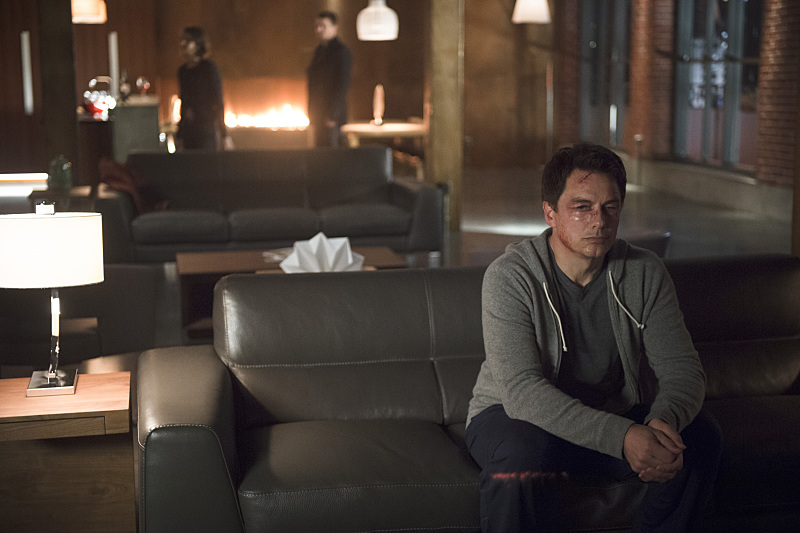
The sins of the father is clearly the theme between Thea and Malcolm, and her existential battle this year is perhaps even greater than Oliver’s. She’s fighting for her soul in a way her brother wasn’t able to during his time on the island. Oliver became a killer as a means toward survival in an impossible situation. Thea has been manipulated into killing someone dear by her own father, but worse is she feels down in her core that she is capable of murder on her own. Though one can assume a path of redemption where she gets to apply her skills along the same path as her brother and her [rekindled] lover is on her horizon, it’s still not entirely transparent what Thea’s journey is going forward.
Willa Holland’s work with some darker themes is welcomed, but keeping in her a rut of grousing about Malcolm isn’t an appealing prospect. It’s nice to see some pushes into other directions, both with tempting Nyssa to take her life and with reaching out to Roy. If they can keep her moving forward, a masked future could prove to be an earned one. On the other side of things, John Barrowman does some lovely work spending most of the episode silently and softly reacting to the discussions about Malcolm going on around him. Simply reacting to situations can be one of the hardest yet most rewarding activities for an actor, and Barrowman is superb throughout the hour.
Perhaps the most affecting of the daughter-father confrontations in the hour is that between Laurel and Quentin Lance. Though all three situations end with the daughters in essentially the same place, Laurel’s is unique in that it’s really Quentin turning against her, and heartbreakingly so. Cassidy and Blackthorne frequently do great scene work together, and their discussion at the police precinct is one of the highlights of the series for the pair. Laurel knows things are bad between them but she doesn’t truly understand just how crushed her father is until that moment. It’s not for nothing that most people find a parent being disappointed in them more gutting than a parent being angry with them. It’s the kind of cut that lasts longer for both, if not forever.
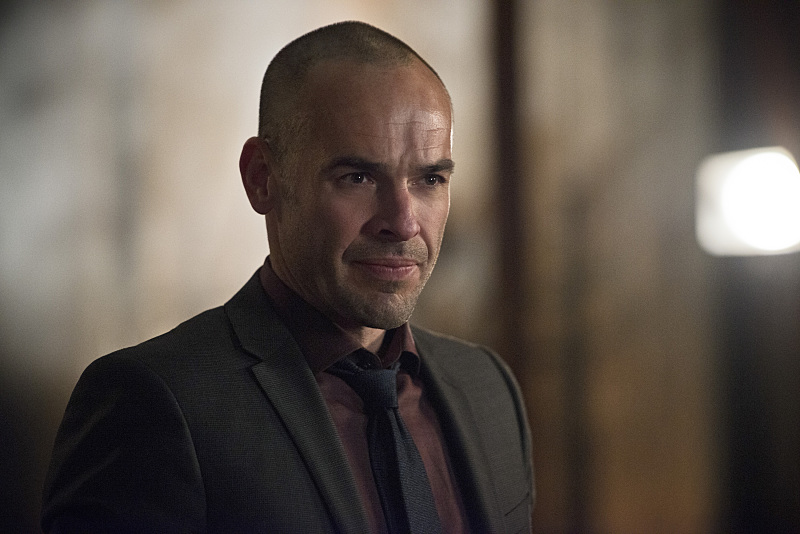
For Quentin, he hasn’t just been lied to, no matter the reason. His trust has been completely shattered because this was his daughter’s life. The admonishment he gives to the Arrow was harsh and poignant because it was thoroughly true. He compromised his own beliefs because he trusted that this hooded vigilante could help him accomplish the very justice to which he’s committed his life. Oliver takes it hard because it’s not just anger but a very real sense of betrayal of this bond they had built. With Laurel, that’s magnified incalculably. The moment he tells her that he’ll always love her as his daughter but that he’s done with her — that instant he says he’s not proud of it — was wrenching and completely honest. How does one truly get over something like this? Of course, he looks out for her safety when Murmur’s men raid the precinct and begin shooting it up, but the bond is beyond broken.
That makes it only natural that Laurel and Nyssa would gravitate together. It’s been obvious for weeks that Laurel is going to need more training to properly acquit herself out in the field, so there’s a bit of convenience to the whole thing. Still, Nyssa makes a great deal of sense as a mentor for Laurel. Plus, it keep Katrina Law around longer. It’s a win-win.
While the parallels of the three women were compelling, and the brief action beats added some nice spice notes — Roy getting some kicks in during the precinct fight — what really stood out as the defining feature of the episode was the slow, methodical pace. This was positively essential to the weight and impact of Oliver’s consideration of Ra’s offer and his ultimate decision.
Matt Nable continues to give a fascinating and enigmatic performance as Ra’s. He still might not be everyone’s cup of tea, but I think he really sells the world-weariness of the character. The extent of his dangerous nature still hasn’t been fully realized on the show, and that actually serves to make the story stronger in this last act of the season. Ra’s won’t take no for an answer and to see him don an Arrow costume to get the city to turn against our hero is but a tantalizing taste of what’s to come. The great thing about this development is that it finally feels like there is a goal that pits protagonist against antagonist. It’s something that’s really been missing from the season so far.
What’s really engaging about Nable’s turn this hour is that Ra’s is legitimately trying to entice Oliver. It’s not a trap, it’s not a sales pitch, per se. He’s devoted his life to this cause, this title, and the scores of people who have devoted themselves to the order of the League. He feels it an honor, a privilege, and a responsibility towards justice on a global scale. He recognizes a compatriot in Oliver, and so he calmly and logically presents his case. It’s not surprising that Oliver would actually consider the offer. Everything about that first act of the episode was truly intriguing to watch in its simplicity.
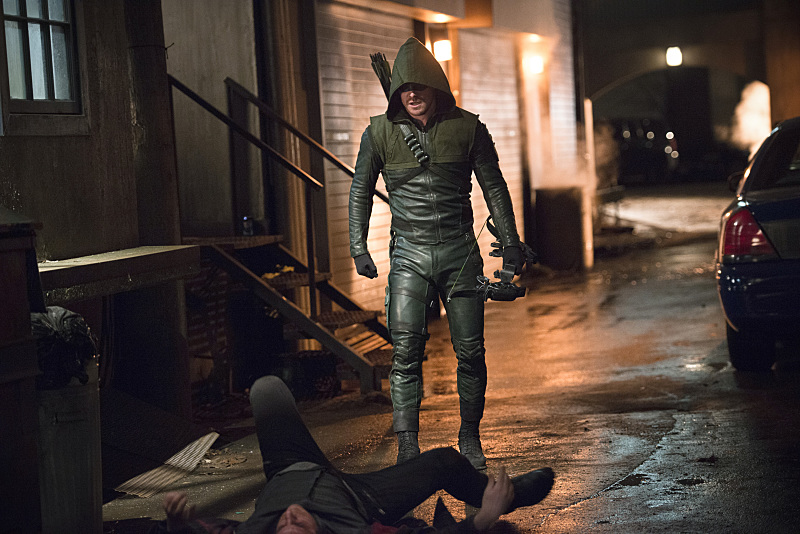
It’s a great development that Oliver is starting to see some light at the end of the tunnel of his existential journey. In truth, it’s becoming a bit of a cliche to have Oliver yet again discover his reason for doing what he’s doing; he’s done that at least twice in each of the previous two seasons. Even more so that it took Felicity kicking his butt in gear to come to the revelation. With the potential coming up that the Arrow is going to go back to being perceived as a public enemy, it helps that Oliver is collecting himself.
Even still, that doesn’t take away from Oliver’s careful pondering of what becoming Ra’s al Ghul could mean. Though he might have walked away from an answer in Nanda Parbat, it was refreshing to see him not just self-righteously dismissing the offer out of hand. The reality is that the position with the League actually does offer him the potential to take his cause global, and a reach to do significantly more than he is now. Something like Brick coming to power and essentially wiping out the fruits of his labor over the last two-plus years would be little concern with an army at his command. His apprehensions would be the natural worry of being corrupted by power, but also a loss of the personal connection to his efforts.
While it might have been more interesting to see Oliver wrestle with the offer over another episode, it didn’t once feel that he did not pay appropriate due to the consideration. From it, we got a touching scene with Oliver opening up to Diggle. (Any time Oliver let’s down his guard and addresses Diggle as “John” in a conversation is a welcome moment.) We also got two lovely scenes between Oliver and Felicity that felt a bit more human than they have in a while. Getting these two back to recognizing their connection and importance to one another as people rather than constantly pushing relationship angst would do great things for both characters and the show in general. It was nice to have a reminder, even if it wasn’t presented as purely platonic.
Oliver Queen feeling like a flesh-and-blood person is enough to push this episode to the top of the list this season. Giving some heft to the offer and setting a pace slow enough for Oliver to give it some serious thought also make the hour standout. On top of that, the conflicts between Nyssa, Thea, Laurel, and their respective fathers adds alluring color for the supporting cast.
Now, we get to see just what Ra’s al Ghul is capable of.
Odds & Ends
- “Al Sahm” is Arabic for Arrow. Though, it’s mispronounced “al sahim” in the episode.
- Tying the Lazarus Pit to concepts like the Fountain of Youth and the mentions of al-Khidr and the fountain of life in the Quran serves to ground the concept. That Oliver readily accepts it given things he’s seen also allows them to move past it without spending too much time on trying to justify it. Interestingly, al-Khidr is sometimes referred to as the Green One or the Verdant One. Quite fitting.
- “They’re the League of Assassins. That is not the name of a nice group.”
- “I see the man under the hood now. He lies and he keeps secrets…” Well, duh, Quentin. He’s wearing a hood and a mask. Kind of some dead giveaways there.
- “Detective?” “IT’S CAPTAIN NOW!” Grateful to Lance finally putting his foot down on the distinction. Though, if Oliver had elected to become Ra’s al Ghul, him calling someone “Detective” seems rather fitting.
- Felicity’s ongoing evolution into a skeleton key of technological ability rears its head once more. It’s a crutch and a cheat. We know she’s smart. Don’t diminish Ray Palmer’s intelligence just to both make her look stronger and to turn the whole thing cutesy.
- Is Nyssa’s offer to help train Laurel altruistic or a step in a plan to get back at both her father and Oliver? (And could Thea’s offhanded mention of futura pay an unintended consequence here?)
Matt Tucker Editor/Senior Writer/Reviewer
Matt Tucker is a stage and film actor, writer, Seattleite, comics nerd, sports fan, and aspiring person. Someday, he’ll be a real boy. He's an editor and senior writer for KSiteTV network (GreenArrowTV, DaredevilTV) and the sports blogs Sonics Rising and Cascadia Sports Network. Follow him on Twitter at @MattBCTucker or @TuckerOnSports
Arrow Reunion: Calamity Jane Now Available on Tubi
News Jun 17, 2024
Arrow Season 8 Blu-ray & DVD Coming April 28
News Feb 5, 2020
End of an Arrow: Thoughts on the Series & Finale
News Jan 28, 2020
